Introduction
There have been many discussions recently about the book recommendations that are given to new readers. Subsequently, there have been many discussions about the books that brought us — the established readership — into the fantasy genre. There are many aspects to this conversation, and there is a lot of nuance here, but I thought it would be interesting to explore these “gateway books”. I’ve done something like this before, but thought it would be more informative if I tried to quantify the responses this time around.
A month or so ago, I sent out a questionnaire. I posted it on my Twitter, got permission to ask the good people over at /r/Fantasy, and I got a lot of responses! Almost 700 of them! This questionnaire contained a few questions, but all of them centered around our gateways into fantasy. These questions were:
- What book do you credit with getting you into fantasy?
- Was this the first fantasy book you ever read/tried?
- Roughly, how long ago did you read this book?
- Did you find this book yourself, or was it recommended to you?
- Where did you find this book, or where did this recommendation come from?
- What subgenre would you classify this book as?
- Were there any commonly-recommended books that you bounced off of beforehand?
- Did you consistently read fantasy books as a child, or did your parents read fantasy books to you?
- How did you find this questionnaire?
Let’s get a few things out of the way before we begin. Firstly, a sample size of 700 people isn’t going to be representative of the entire genre. Secondly, polling a group of fantasy fans that are deep enough into the fandom to hang around in forums like /r/Fantasy (or follow bloggers like myself on Twitter) isn’t likely to be representative of the attitudes of more casual fantasy fans. Thirdly, different people get into fantasy at different points in their life (and this is just one example of the ambiguity inherent in these questions), so no two answers will be equal. There’s a whole spectrum of circumstances that these questions can’t account for.
Even so, 700 responses is a great response, and I am so grateful to everyone who answered and/or shared the questionnaire. The results achieved may not be all-encompassing, but there is a good level of detail here — more than enough to inform a conversation.
With that out of the way, let’s get started!
The Initial Questions
To start us off, let’s look at those questions that have the most easily-quantifiable results. First of all, how many people credit their first ever fantasy book as being their “gateway” book?

Interestingly, this one is pretty much split down the middle. Around 48% of people credit their first fantasy book as the reason they’ve decided to stick with the genre. But on the other hand, 52% of people didn’t find their gateway book until at least their second book. It just goes to show that sometimes recommendations don’t land. Just because the first book you try isn’t for you doesn’t mean that there isn’t something out there that you’ll fall in love with. It also shows how important a well-tailored first recommendation can be — because how many people are going to try a second book if the first didn’t work out for them? The above chart doesn’t take into account those people who walked away after a bad first experience.
Up next, how long ago did the polled fantasy fans read their gateway book? This is the sort of thing that should correlate with age in a lot of cases, but admittedly I didn’t want to directly ask about age for fear of making the questionnaire seem too invasive (and subsequently limiting the number of responses I’d receive). Regardless, these numbers throw up some interesting patterns, and will form the basis for the deeper dive that we’ll get into in the later sections.

The numbers for this question blew me away a bit, honestly. A massive 84% of polled fantasy fans found their gateway into the genre more than 10 years ago, and 70% of fans found their gateway between 10-30 years ago. It shouldn’t be a surprise to anyone that this 20-year period was massive for fantasy. There were the Lord of the Rings and Harry Potter movies, as well as the books. This also marked the period of peak popularity for other series such as Dragonlance, Eragon, and the Belgariad (among others). Put simply, 1990-2010 was a huge boom period for fantasy, and this period seems to be responsible for bringing the majority of the (online) fanbase into the genre.
The elephant in the room here, however, is Game of Thrones. It would appear that the TV show brought fantasy back into mainstream pop culture in a way that it hasn’t been since those aforementioned Lord of the Rings and Harry Potter movies. It would follow that you’d expect to see a large portion of new fantasy fans within the past 5 or so years. So why doesn’t that appear to be the case?
The short answer is that I’m not sure, but I have suspicions. One of which is that Game of Thrones is an adult series, meaning that those who watched the TV show had likely already been exposed to the fantasy genre when they were younger. In other words, many (not all) of the people who springboarded into the fandom off the back of the GoT show may have already been fantasy fans on some level — even if casual or lapsed. While there’s every chance that GoT could have brought these people back into fantasy, they may have credited earlier, childhood influences as their gateway.
Of course, given that the majority of people find their way into fantasy as children (more on that shortly), it is also possible that the majority of recent fantasy converts are children. These fans simply might not be old enough to find their way into online fandom. So while it might seem like we’re going through another fantasy boom period right now, it might take a few years before the effects of this start appearing on graphs like the above. Of course, there is always the possibility that some of the respondents could be children online.
But moving onto the next question… how about how people find their gateway books?

It’s interesting to quantify just how important recommendations are when it comes to people finding their way into the genre. Around 59% of people find their gateway book via a recommendation, with the remainder finding those books by themselves. There’s obviously a lot of ambiguity here, as “finding” a book could involve picking a title based on an article/review/list from a website much like this one — which some would count that as a recommendation. Either way, it goes to show just how much of an impact yelling about books can have.
Circling back to an earlier point, this also hammers home (again) just how important those first recommendations can be. If someone is given a book rec that doesn’t take into account their likes and dislikes, and then they dislike that book… well, there’s no guarantee that they’d ever try to read another.
But what about subgenres? Well, it should be a surprise to nobody that Epic Fantasy wins the day with this one…

Epic Fantasy is the subgenre that many people first associate with the wider genre before they’ve had much exposure to the other types of fantasy that exist. It makes sense. A lot of the more popular public-facing books through the years have been epics. The Hobbit, Lord of the Rings, Eragon, Belgariad, Wheel of Time, Narnia, Dragonlance, Prydain… But as we know, there’s a lot more to fantasy than just that. And that’s reflected in the above results. Epic Fantasy is a huge part of the genre… But it’s nowhere near all of the genre.
Another interesting point to note is how large that “other” section is. It shows how varied tastes in books can be, that they extend beyond the most common subgenres. (Though I’m willing to guess that some people will be seething that I’ve excluded their favourite subgenre in the default options.)
But now on to the set of results that surprised me most from this whole thing…

So it turns out just over three quarters of fantasy fans were read fantasy books by their parents, or started consistently reading fantasy books as a kid. This actually sorta backs up my “GoT fans were already fantasy fans” theory from earlier, but it still blows my mind. Is a lot of this a result of that 1990-2010 boom? Did our parents just really like The Hobbit, Narnia, and Redwall that much? Is it some combination of both, perhaps along with some other stuff?
This shouldn’t seem so wild to me, I suppose. I read my fair share of Harry Potter as a kid. But still. I wonder, maybe, if this is part of the reason why fantasy has such a (unfair) reputation for being childish? While those who replied to the questionnaire have obviously went on to become adult fans of the genre, there may be those who read fantasy books as a kid, and then felt like they “grew out of it”.
I’m also wondering if this is part of the reason why we had that huge surge of grimdark books in the late noughties to mid 2010s. Was this, in part, a reactionary rejection of the idea that fantasy was “childish”? With the rapid introduction of more “adult” motifs like extreme violence, cynicism, and grey morality?
There’s a lot of room for speculation there, but that’s probably outwith the scope of this post. I’ll leave that thought there for now, and move on to the last of our initial graphs…

Quite simply, this is just a breakdown of those who responded to the questionnaire. As you can see, the majority of these were from Reddit, though there were a good 150ish people from Twitter too, as well as a few from a couple of other places. I was interested to see whether the social media platforms differed much in terms of responses, so we’ll have a look at the breakdown of that later.
But before that… Let’s (finally) take a look at the books themselves.
The Most Popular Gateway Novels
To begin with, let’s take a wider-picture view of the results, and then we’ll work our way down into the specifics. I tried my best (with the help of some friends) to group together books from the same series. This just makes things easier to visualise when we plug that data into a graph. But even with this consolidation, There were 137 different books that were credited as gateway novels from 699 responses. This means that roughly every fifth person was brought into fantasy via a unique gateway book. That is a tonne of variety. And you can easily see that when you look at the sheer number of colours in the below graph.

There aren’t too many shocks here, admittedly. A lot of those names down the right-hand side are pretty much what you’d expect to see — although I am personally a little bit surprised to see that Eragon was that popular. It’s also interesting to see Game of Thrones so far down the pecking order, behind other series like Wheel of Time, Redwall, and Dragonlance. It’s easy to underestimate the popularity of these compared to those that had the big-budget TV shows and movies. However, given that they’re some of the best-selling series of all time (not just in fantasy), it shouldn’t be a surprise.
Things get a little bit more interesting when you look at the graphs by author, rather than by book:

With Weis/Hickman, Tamora Pierce, and Anne McCaffrey, and Emily Rodda shooting up there, this graph looks a little bit less of a sausage-fest. A little. But we’ll get into that later. Again, though, I am shocked to see that Christopher Paolini is the FOURTH most popular gateway author in fantasy. The fact that Brandon Sanderson has shot up into the top five is interesting too. Make no mistake, Sanderson is a huge deal. And unlike the rest of the top five, he has managed this without a movie (or a massive publicity campaign targeted towards school children). Remember, we’re talking about gateway books here, so in many cases these are the authors and books that are presented to the general public as the faces of fantasy. And George R.R. Martin only barely cracks the top 10.
One thing these pie charts don’t account for, though, is time. Series like Narnia and the Belgariad were popular years ago, but is that still the case now? I’ve graphed the top 21 gateway series over time (split into two graphs for readability), so let’s find out:


There are a number of interesting things here. The most obvious is that Harry Potter dwarfed every other series in terms of popularity when it released. It’s interesting too that Eragon followed pretty much the exact same trajectory as Potter. On that first graph, though, every series besides GoT is trending downwards. These books just aren’t grabbing people like they used to. The books targeted towards children may be under-represented towards the right-hand side of these graphs given that our respondents likely skew older, but the rest don’t really have that excuse.
Looking at the second graph, we can see that the only books that have actually increased in popularity are Game of Thrones, Mistborn, and the Kingkiller Chronicles. The first obviously benefitting from the TV show, and the latter two being massively popular recent-ish publications. I knew that Mistborn was popular, and I was all-too-aware that it was recommended a lot, but to see that in the last 10 years it is actually a more popular gateway than GoT? I find that insane.
These more recent trends caught my interest, and so I isolated those books that have increased in popularity from 10-20 years ago to now.
(Sidenote: my favourite part of this whole thing was one dude that wrote that they’d read Kingkiller 20-30 years ago. It was published in 2007, friend. You haven’t been waiting quite that long for a sequel.)

We’re getting into the realm of very small sample sizes here, so any takeaways in this paragraph should perhaps be taken with a pinch of salt. But even so, when considering the books that are listed in the above graph, most of these have been published fairly recently. Of course, recently published books are obviously going to increase in popularity (unless they somehow never sell a single copy), but it’s interesting to see just how many of these books are bringing people into the genre.
Now, some of you might be noting that Malazan is up there. And I’ve got something interesting to say about that very soon. But first, let’s wrap up this section by looking at when the books put forward in this questionnaire were actually published.

Of the 137 different books/series put forward, 27% of those were published within the past 10 years. (Note that for series, we went by the date of the last book published) That might not seem like much initially, but remember that 84% of respondents found their gateway more than 10 years ago. What does this mean? Well, a lot of this is open to interpretation, but combining this fact with the decline in those previously-popular 80s/90s books? For me, this suggests that many of the people who are getting into fantasy in recent times are doing so via more recently-published books. The data seems to agree with this, as from the 699 submissions, 28% of those involved recently-published books. That’s pretty close to that 27% mentioned earlier, though I’d have expected a bigger recency bias.
But what if we change the definition of “recent” to mean that the first book of the series has been published within the past 10 years?

Yikes.
Okay. But that’s considering all 699 responses, yeah? Most of those people got into fantasy before these books were even published. What if we isolate this for only the people who found their gateway book within the past 10 years?

Uh. Okay that’s better, but not by much. What this would seem to suggest is that, yes, people are reading more recently-published books… but only really those from authors who have been published for a while now. If we go by the last book in the series, then series like The Wheel of Time, Game of Thrones, Mistborn, and Name of the Wind count. But if you look at the publication dates for the first novels in those series… 1990, 1996, 2006, 2007.
What this means is that there are a lot of fantastic debuts that are, relatively speaking, flying under the radar. It also means that there is a hell of a lot of great recent books (this website is full of reviews for them) that deserve to be shouted about a hell of a lot more, to help them find the right readers.
I can already hear some people complaining about this. Why should we devote attention to these newer books when the classics and the more popular books are “objectively the best”, right? Well, no, that’s not right at all, actually. Books are very subjective, as the following section will show.
When Recommendations Don’t Work
In the questionnaire, I asked if anyone had “bounced off” a commonly-recommended book prior to finding their gateway. In other words, had they tried a popular book and found that they didn’t like it. The results for this were very interesting. To make them a little more informative, I combined these “failed” recommendations with the number of “successful” gateways of that same book, to give a bounce-off percentage. This is basically a failure rate — the higher the percentage, the more likely the recommendation was to fail.
I’ve tabulated some of these results in the table below, also providing a sample size for context. I have a lot more data, but in the interest of keeping this table readable, I’ve cut off the bounce-off at 20%, and the sample size at 2.
| Book | Bounce-off % | Sample Size |
| Sword of Truth | 100% | 4 |
| The Lies of Locke Lamora | 75% | 4 |
| Malazan | 67% | 6 |
| Tigana | 67% | 3 |
| Artemis Fowl | 60% | 5 |
| The Phantom Tollbooth | 50% | 4 |
| Twilight | 50% | 2 |
| Lord of the Rings | 48% | 99 |
| Narnia | 40% | 62 |
| Thomas Covenant | 40% | 5 |
| The Wheel of Time | 39% | 38 |
| Xanth | 33% | 6 |
| A Wrinkle in Time | 33% | 6 |
| Goosebumps | 33% | 3 |
| Kingkiller Chronicles | 30% | 10 |
| The Hobbit | 25% | 92 |
| Discworld | 25% | 12 |
| Shannara | 25% | 8 |
| Harry Potter | 25% | 89 |
| His Dark Materials | 23% | 13 |
| A Game of Thrones | 22% | 27 |
| Mistborn | 22% | 23 |
| Percy Jackson | 20% | 5 |
| Night Angel | 20% | 5 |
First of all — RIP Terry Goodkind. The Sword of Truth recommendation has failed 100% of the time for the polled fantasy fans. Although, admittedly, the sample size of 4 is very, very small.
Secondly, wow, Locke Lamora? I didn’t really expect that. Though I guess it’s more enjoyed by folks who are already fans of fantasy, and is maybe not too suitable as a gateway novel? Perhaps the humour is too subjective, or the prose at the beginning too dense. Again though, tiny sample size.
Malazan, though? Yeah. Totally expected that. With a bounce-off of 67%, it fails more than it lands. A sample size of 6 is still very small, but given how dense that series is, I wouldn’t be surprised if that was representative.
But let’s move away from these small sample sizes for a minute, and consider those that have a bit more meat to them. With a sample size of 99 and a bounce-off of 48%, I can reliably say that Lord of the Rings recommendations fail with new readers almost half of the time. With Narnia and the Wheel of Time also having bounce-off rates of around 40%, it seems that these larger, classical epic fantasy series just aren’t for everyone. In fact, they are a lot more divisive than genre “purists” will have you believe.
Many more popular series make the list. The Kingkiller Chronicles and Mistborn, the two most popular series of the last decade, were disliked by 30% and 22% of those who tried them, respectively. Those numbers aren’t insignificant, and again, it goes to show that taste isn’t uniform and that fantasy fans aren’t monolithic. Just because a book got you into fantasy doesn’t necessarily mean that it will do the same for somebody else. This is yet another reason to avoid being lazy with your recommendations.
What About Gender?
Oh boy.
Okay, so I alluded earlier to the most common gateway books being a bit of a sausage-fest towards the top end of the table. But let’s have a more detailed look at this, because there is a discussion to be had here. First of all, let’s consider the 137 unique books/series that were submitted, and see the gender breakdown of those. Note that to my knowledge, there were no non-binary authors among those submitted, and any misgendering is a mistake on my part.

So okay, most of the submitted gateway books were male-authored, but a roughly 70/30 split isn’t the worst I’ve ever seen. Let’s look at how that figure translates into how many people actually read those woman-authored books, though. And let’s see how that changes over time…
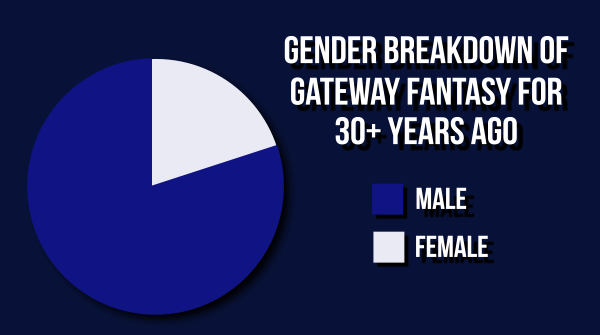
Now this is pretty interesting, and there’s quite a bit to unpack here. First off, it’s pretty clear that when compared to that 70/30 baseline, the male-authored books are over-represented here for pretty much every decade with the exception of 10-20 years ago. This was during the peak of Harry Potter’s popularity, and the gender split during this decade was 64/36. Remember that massive red spike for Harry Potter in those line graphs earlier? Yeah, apparently that only counted for +6% over the baseline.
Another thing that sticks out here is that the past 10 years have been (by far) the worst for the representation of women authors as pertains to gateway novels. Only 10.7% of gateway novels from the last 10 years were written by women. Considering that, generally, women read more than men, this doesn’t seem to be representative of either the author-base or the reader-base. It also highlights a key point that commonly comes up in these discussions about the gender disparity in fantasy…
Remember, 84% of fantasy fans found their way into the genre more than 10 years ago. These fans grew up when authors like Weis/Hickman, Tamora Pierce, Emily Rodda, and Anne McCaffrey were all popular enough to be public-facing, and so were regularly picked up by non-fantasy readers as gateway novels. These authors are often held up as examples of why fantasy is equal. But… that isn’t the case any more. It certainly used to be a lot more equal than it is now, but those books aren’t being read like they used to, and the most common gateway books of the last 10 years are overwhelmingly male-written — Mistborn, Game of Thrones, Kingkiller, Stormlight, Night Angel.
This is in stark contrast to the volume of amazing woman-authored fiction that has been published in recent times — as evidenced by the string of women who have won the Hugo award for Best Novel in recent years. (For context, the gender breakdown of Best Novel nominees for each year since the award’s inception is shown in the GIF below)
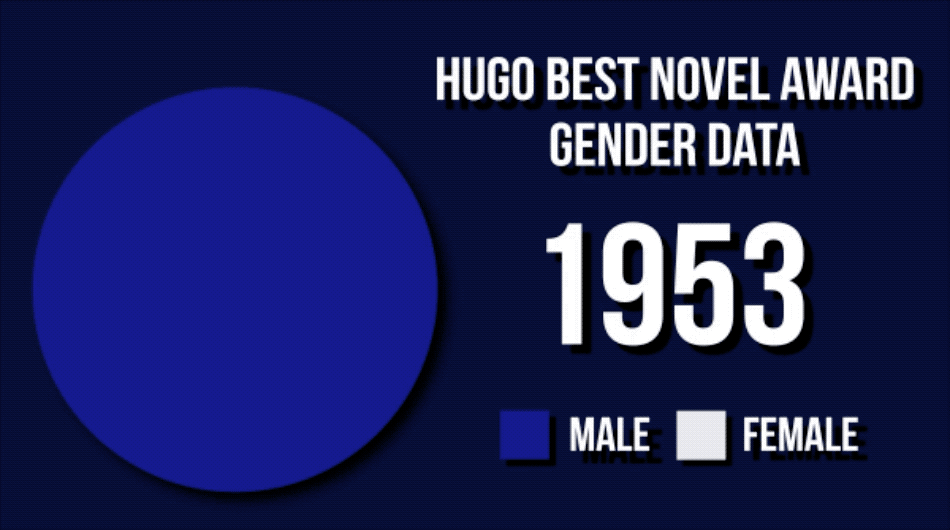
The publishing industry has changed massively over the past 10 years or so. Amazon is king. Book recommendations are more and more often coming from online groups, and from people who don’t know you. Sales algorithms are learning what you like to spend money on, and are shoving more and more of the same thing at you in order to make more money.
There’s a lot of reasons behind the gender imbalance, and a lot of discussion to be had over why it exists. And many of these discussions won’t and shouldn’t stop at gender. I’m not the person to lead any discussions about race, nationality, or queer representation. But just as we recognise that these books are overwhelmingly male, we should also recognise that they are overwhelmingly white, American/British, and straight.
(Sidenote: It’s suspected that Amazon search/recommendation algorithms run on neural networks which are trained by your behavior. Just to get an idea of how this works, check out this video of a neural network trained to play Mario. See how Mario keeps making that same twisty jump? That’s because the network knows it works. Similarly, Amazon can bury you under a tonne of similar-looking male-written books if it knows that’s what you’ll buy. The neural network itself isn’t sexist, but it will pick up biases from its training data and it will amplify them. Amazon has had trouble with this in the past.)
Social Media Breakdown
Most of the responses to this questionnaire came from either Reddit or Twitter. I thought it would be interesting to see if there was any real difference in the responses given by the two. But turns out, most of these differences were surface-level.
The main difference between the two lies in when these fans found their way into the genre, which we suspect correlates with age. Put simply, Twitter skews a little older, and Reddit skews a little younger. Twitter likely has a bunch more Gen Xers, whereas Reddit has more millenials.
What about the books they listed. Were they any different? Sort of, but I suspect any differences are mostly down to the age difference.
Looking at these books, Twitter likes Narnia and Dragonlance a little more, whereas Reddit prefers Harry Potter, Eragon, and the Belgariad. It seems to mostly be a generational thing.
And how about the gender breakdown?


Twitter reads slightly more woman-authored books than Reddit, and is more or less in line with that 31.4% (or 70/30) baseline that we described earlier. Again though, this could be a sign of the age difference, as we know that in previous decades there were a lot more popular books by women.
So in short… there are no real differences between responses from the two platforms, besides those that can be explained away by age. I know a bunch of you were waiting to blame “the other guys” for any questionable results… but I’m afraid that you share any “blame” pretty much equally.
Recommendations vs Solo Ventures
We’re coming to the end of this now, but I thought it would be interesting to explore the differences in gateway books that people found for themselves compared to those that were recommended.
First off, here are the gateway books that were recommended:

This is fairly similar to many of the graphs we’ve seen so far. No shocks there. But if we compare it to those gateway books that the readers found themselves…

Eragon is the most popular book. Wow. Prydain takes a massive jump up to third place, too, with Deltora Quest also taking an impressive jump. I… don’t have any reasons for this. I suspect that books like Eragon were maybe marketed really heavily towards school kids, but that’s pure speculation. If anyone has any theories for the reasons behind these differences, please share!
Conclusions
Much of what we’ve looked at hasn’t been too surprising, but there is a lot of interesting information here which can be a starting point for many different discussions.
Given that so many popular books have such a high failure rate when recommended, and given that so many people don’t find their gateway with their first fantasy book, we should be more careful with our recommendations. We should also be aware that the gender disparity for those public-facing potential gateway books is at the worst it has ever been. There are also a lot of really, really good recently-published books out there that don’t get the attention they deserve. Again, this website is full of reviews for those books, so be sure to check those out.
Now there are a lot of things I could have done better with this whole situation. I could have asked more questions, phrased them to be less ambiguous, and many other things. But hey, it’s a starting point for a more informed discussion, I’m only one guy*, and I have sunk far too many hours into this post as it is. But anyway, I hope this has been informative, and if there’s any other funky correlations that you’ve spotted in the above data, then let me know!
*Except when I’m not. I’d like once more thank everyone who shared and responded to the questionnaire, I literally couldn’t have done this without you. And thank you to everyone over on the Fantasy Inn Discord who helped me work through all of this data. A specific shout out to Lynn, who spent a good amount of time finding publication dates for all of those books with me. You folks are the best.

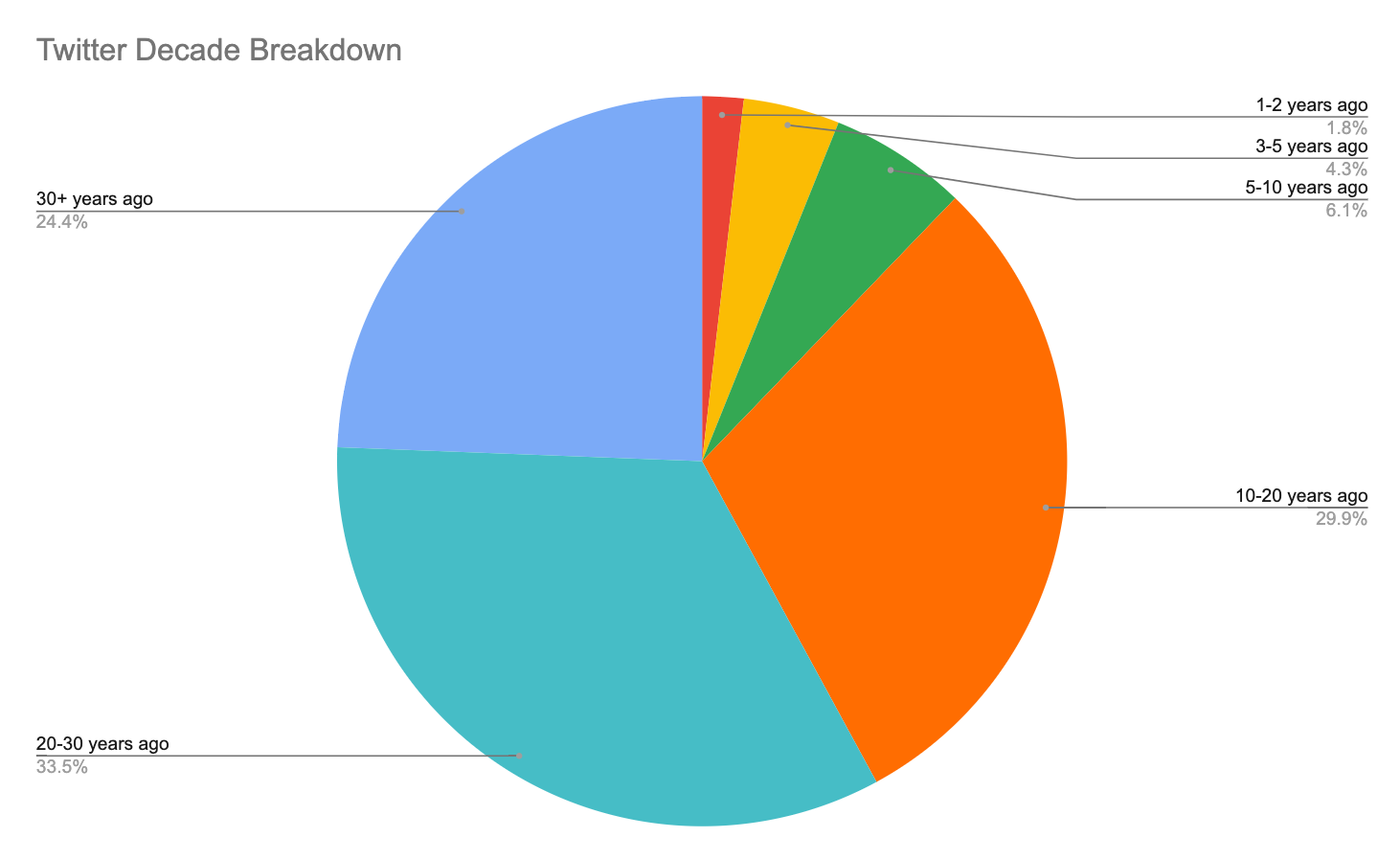
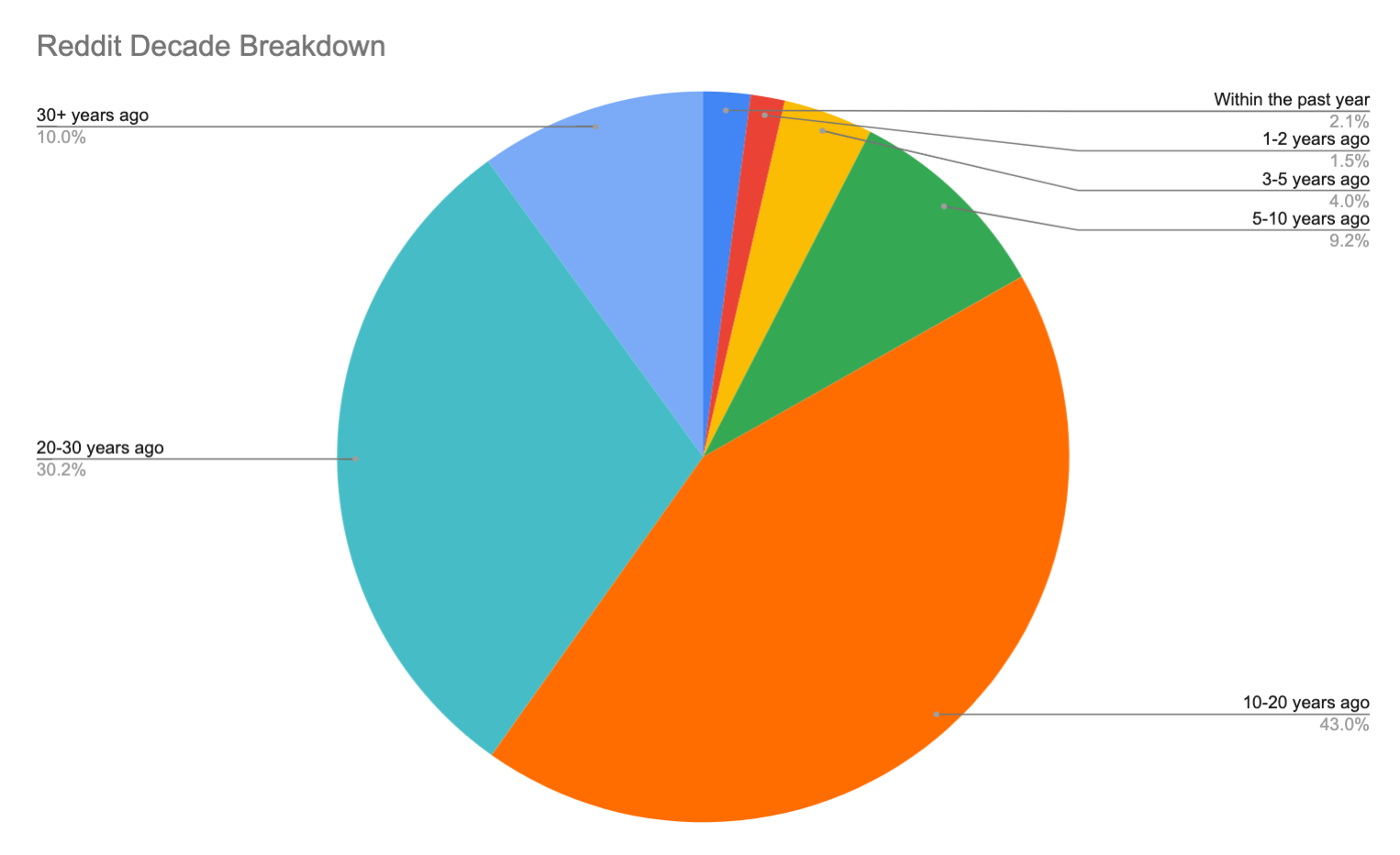
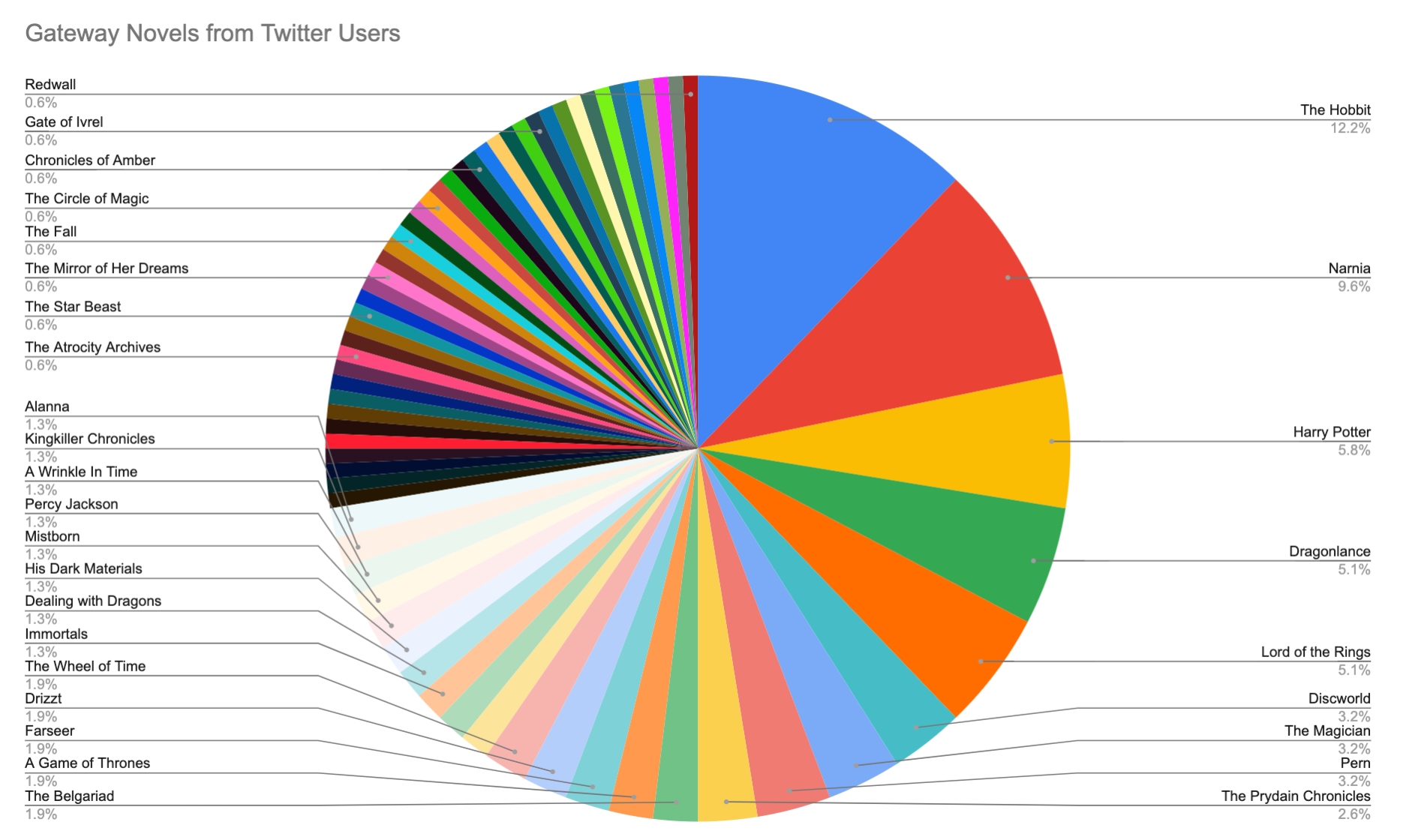
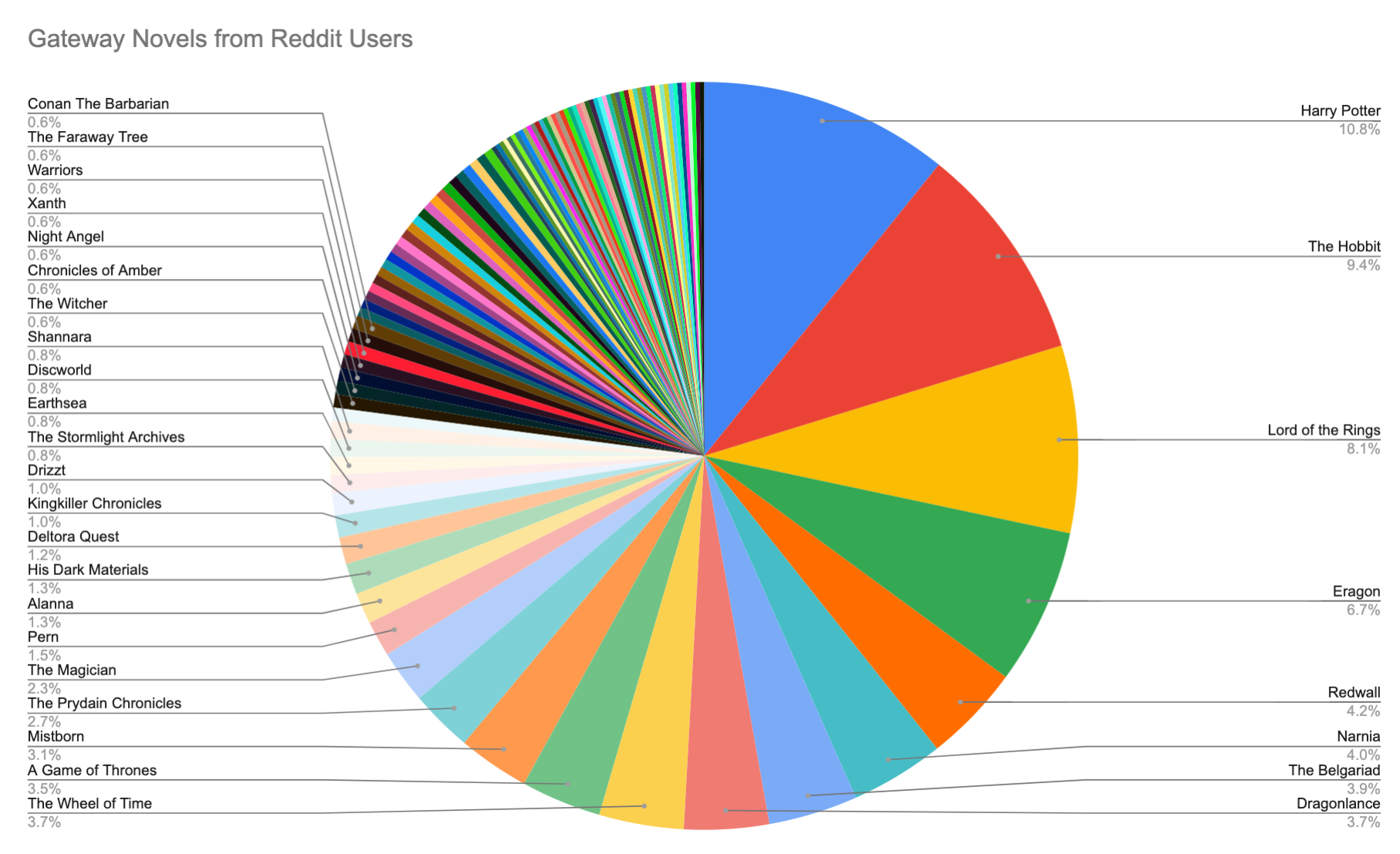
So I saw a title repeated numerous times in your graphs, “The Magician.” I have no clue what book or book series that is (I even went to Google, and I doubt it is either the Sol Stein or W. Somerset Maugham books as they don’t fit the subject). All I can figure is that is either a typo of “The Magicians” by Lev Grossman or a typo of “Magician” by Raymond E Feist. Which one is it?
I think the Twilight crowd is often funneled into the Cassandra Clare/Sarah J Maas/Leigh Bardugo fandoms. They often have followings that dwarfs most fantasy fandoms and they are also more likely to get screen adaptations. I am in a Facebook book club and usual staples of r/fantasy are barely mentioned while there is a tonne of chatter over these Clare/Maas/Bardugo titles. And these readers rarely consider themselves fantasy fans—they tended to identify as YA/romance fans.
Wow! such awesome content. I like it so much. Very informative post for us.
wonderful post I read so far. The information is much helped me